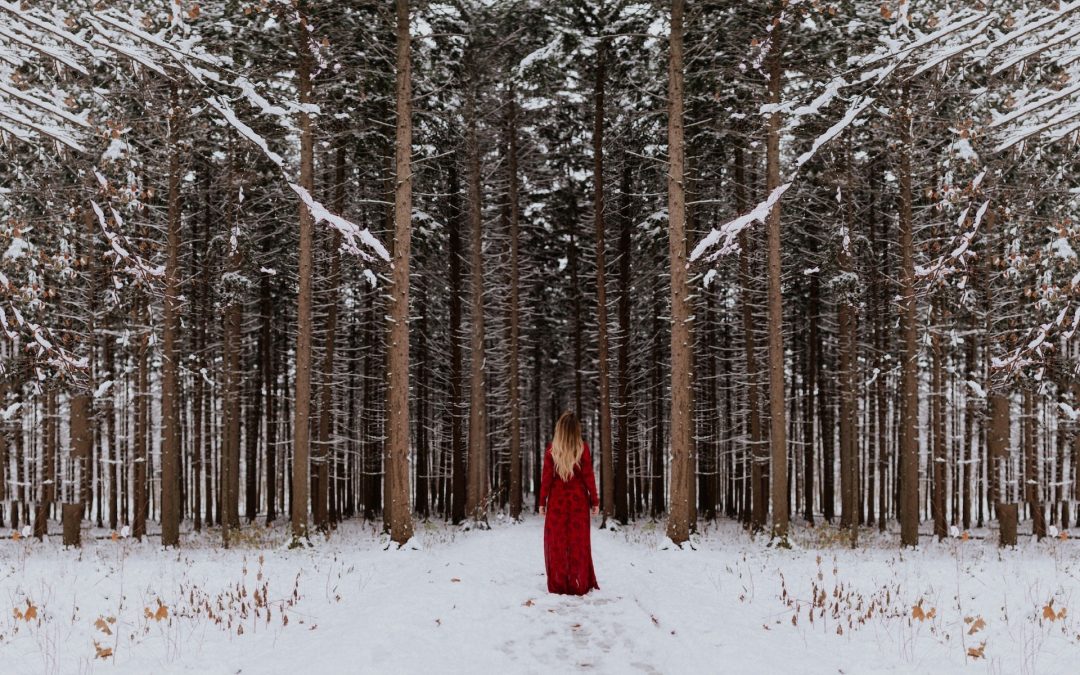by Elle Harrigan
Oh, how we love this time of year! The decorations. The food. The gift giving (and receiving)! We set up evergreen trees laden with lights, put wreaths on the door, and hang mistletoe, rarely with any sense of the meaning behind these traditions. Like many cultural celebrations, these practices can be traced back to our deep kinship with nature and its cycles of growth, harvest, and rebirth.
Late in December, we experience the shortest day and longest night. From ancient times to now, our ancestors celebrated this cosmological event with rituals to both ward off evil spirits of darkness and welcome back the sun. The beginning of winter brought a recognition of continuity: the ending of the previous cycle and beginning of a new season of growth. It opened a door to transformation.
What we now call Christmas began in nature rituals, remaking over and over human kinship with the land, water, and celestial lights. It’s thought that the celebration of Yule originated in the Norse tradition of jol, and also appears in Old English a geol. Eventually, the rituals of feasting, burning yule logs, and decorating trees became incorporated into what we celebrate as Christmas.
In our modern times, we embrace the concept of change by making New Year’s resolutions. The problem with resolutions is that they’re mental games we play with ourselves. We get a second chance. A do-over. Didn’t lose that twenty pounds we promised ourselves to lose? Let’s try again next year.
The urge to let go of the past and welcome rebirth never fades. As created Beings, we hunger for self-realization. Like the butterfly that must break free of its cocoon in order to fly, our soul cries out for renewal. Unkept resolutions remind us that all true change happens at a deeper level. To experience real transformation, we need to cultivate a new level of awareness. Without tribal ceremonies to create states of transcendence, we’re left to walk the spiritual path scratching our heads.
The great gift of nature is that it’s our ever-present wisdom teacher. By mindfully encountering the natural world, we reclaim our kinship and create receptivity. To do so, we need commitment to more than a single holiday. We need to adopt personal rituals that allow us to rise beyond our self-centered interests and undergo the kind of metamorphosis that releases our true Being.
Meditation or contemplative practices have proven to be the most effective ways of releasing ourselves from the constant pull of the ego. Rather than sitting and focusing on our breath in order to enter a state of stillness, nature invites us to heighten our awareness through our senses.
Where do you begin? With your five senses! As human beings, we’re graced with the ability to see, hear, taste, feel, and smell, and the consciousness to give our sensory experiences meaning.
With deliberate attention to see the familiar in new ways, to taste and smell the scents on the air, and feel the textures of natures’ flesh and bones, we experience the aliveness, majesty, resilience, and groundedness of creation. Such kinesthethic encounters with the wild shift us into the present moment and open an inner channel to receive guidance, healing, and serenity.
We can easily turn our morning “health walks” into meditative exercises with intentional awareness. Step one: Unplug from your mobile device, slow down, and focus all of your senses on what surrounds you. Step two: Listen to the cacophony of bird songs, feel the sun on your face, see not only the trees in the distance, but the leaves on the branch hanging overhead. Drink in nature’s canvas with wonder and reverence. Be present.
With practice, our hearts begin to beat with the rhythms and cycles of the seasons. The flow between action and rest, planting and harvesting, letting go and rebirth becomes our framework of time that’s aligned with nature rather than the clock. We embrace renewal.

